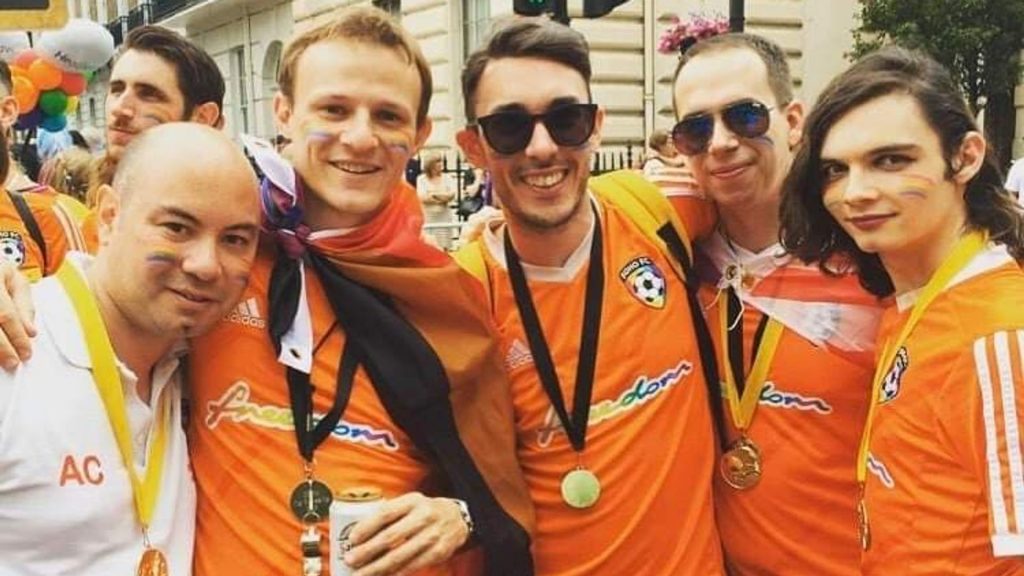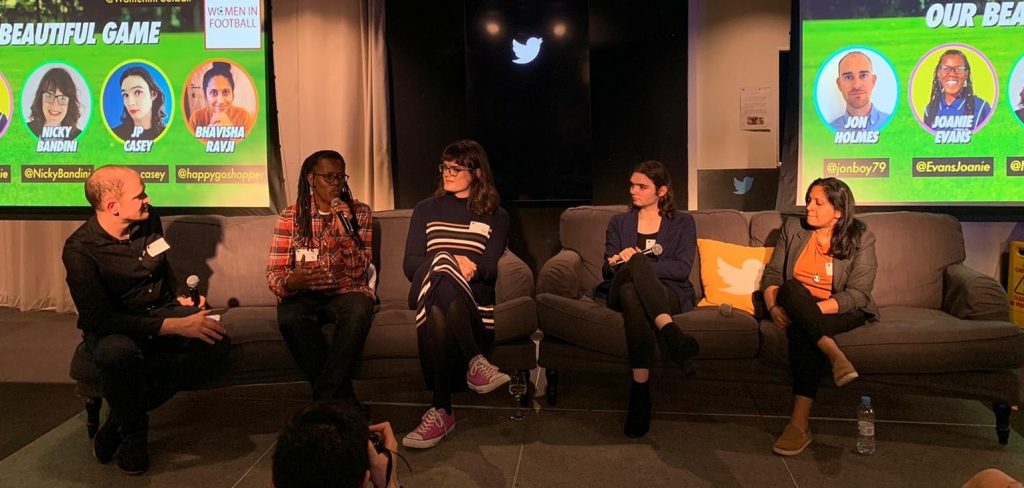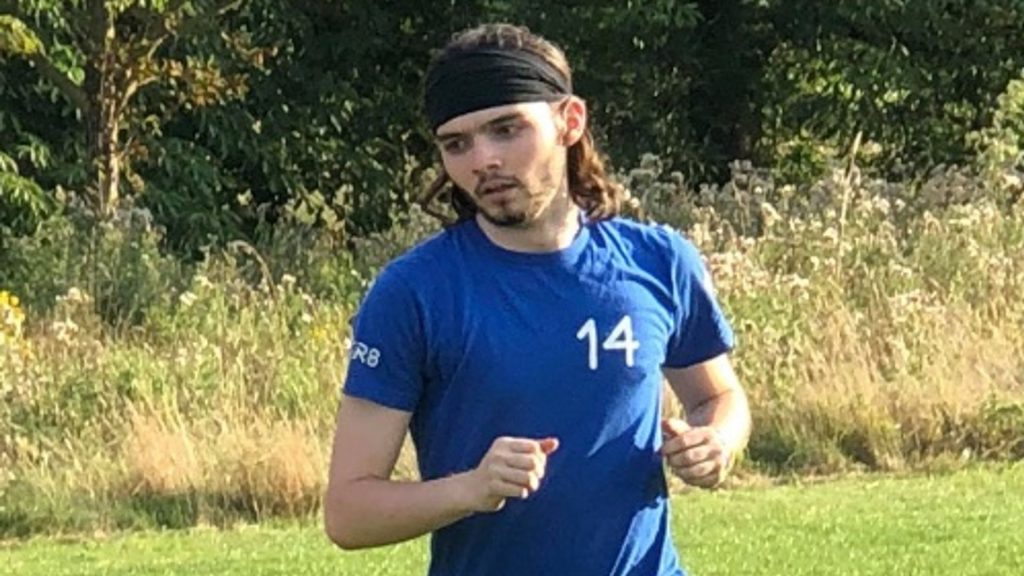International Pronouns Day: JP Casey on being non-binary in sport

What’s it like to play team sports when you’re non-binary? And how do pronouns play a part in that? Our latest Q&A feature reveals all…
By Jon Holmes

International Pronouns Day is observed annually on October 21, raising awareness around an important aspect of LGBT+ inclusion.
The day reminds us of correct pronouns usage and how ensuring this can help to make trans and non-binary people feel welcome.
To mark the occasion, Sports Media LGBT+ caught up with our friend JP Casey who has been playing football with Soho FC since 2018 and helped the team to the London Unity League title in 2019.
They were a guest panellist at our #AuthenticMe event at Twitter UK HQ in London in 2019, and they have also been featured this year on Sky Sports in an article about the Football v Transphobia campaign’s annual week of action.

For this Q&A, Jon spoke to Casey about their sports experience as a non-binary person, and why International Pronouns Day carries an important message…
Hi Casey! Tell us about your early sports experience. Did you play much football at school?
No, my secondary school in north London didn’t play football – it was a boys’ grammar where the focus was all about rugby. I played five-a-side football now and again until I was about 16, and then I didn’t play at university either because I didn’t really enjoy the vibe of it – I hadn’t come out at that point so I was less confident. I didn’t play again until joining Soho in the spring of 2018.
I played a lot of other sports though – none of them well! At school, I played a bit of rugby, did athletics and other things that everybody else was doing, and it was all fine. Later, I went to UCL and I came out as both queer and non-binary at the start of my second year. At that time, I was already playing dodgeball, handball, American football and doing karate. Unsurprisingly for a London-based uni full of liberal, young people, everyone was really cool with me coming out.
So you really threw yourself into sport at uni?
Yeah, I did that thing at freshers fair where I signed up for lots of things because they give you sweets and chocolate if you do! But then I just kept going to them. I had to give up handball sadly because I didn’t have enough time but the others I stuck at the whole way through. American football was different because I was a fan of the sport anyway and there wasn’t a club yet, so I was involved in setting it up. So that was more intentional.
I didn’t expect sport to feature so heavily in my uni life. I read English and went there thinking, ‘I’m going to be a writer or an academic’ and that would be my focus. But I quickly became the one person in our circle of friends that was interested in sports, and then it sort of became self-perpetuating.
What was it like to come out as non-binary within those sports environments?
I spoke to my closer friends about it – some of them were part of the sports teams, some of whom weren’t – over the course of a few months. It’s always weird coming out as non-binary because your whole aesthetic is often not overtly masc or overtly femme so then presenting as that doesn’t feel ‘different’ to others, as such. Masculinity is in that place where it’s also seen as the neutral. So when you’re saying, ‘hey, I’m non-binary!’ and you’re just wearing jeans and a T-shirt… inside, you’re thinking, ‘I know I look the same, but it feels different!’
But when I came out and started presenting femme for events, then that was like, ‘OK, this is a very clear visual representation that something is different’. Ever since that point, I’ve said, ‘hey, I’m Casey, I’m a they’ to any new person I meet, and that sets the tone.

Did you get a lot of questions?
The people I was closer to were curious on understanding the thought process angle. Understandably I think, you’re possibly a little worried if somebody comes out to you and says, ‘call me by different pronouns’. Some people were like that, and a few people I knew less well we’re asking slightly more intrusive questions – not quite of the ‘so, what’s in your pants?’ level but with more of an interest than out of care, perhaps.
But I was always fairly fine with it. I feel like the important thing is intent for me. A lot of the time, I look like a dude – I have a beard, a deep voice, a very square body – and so then if I go to some event and I’m presenting very effeminately but I still have this voice, I understand that some people are going to be like, ‘oh, hmm…’
So I don’t mind answering their questions as long as they’re not super gross or an inquisition – the questions where the person is asking not to learn but to highlight the perceived ‘weirdness’ of the person they’re asking. They’re more looking to challenge you or catch you out.

Where did you learn about gender?
Actually, it was on Tumblr – a ‘masterpost’ of genders, which people had submitted and a brief definition of each one. It resonated with me. When I was younger, I didn’t feel comfortable being called ‘he’ or being considered a guy. Then when I was 16, 17, I was aware of trans people but I also don’t think that I’m a woman. I don’t want to be called ‘she’; there are certain masculine aspects of me that I don’t want to abandon.
Through some confused Googling ‘what am I?’ or similar, I found the Tumblr and there was this big category for non-binary gender. One of them was genderfluid, which describes when your presentation changes very frequently. I liked that because there are elements of gender presentations across the spectrum that I might want to present as. Having that word helps to legitimise who I am.
However, I just generally go with ‘non-binary’ because it’s a broader term. Once you start ‘boiling down’ the identities, that can potentially confuse people so it can be helpful to take a broader approach. However, if you’re super into one label, that’s fine too – that’s your thing.
Were the uni sports you played split by gender?
Yeah, both karate and dodgeball were split. I did wonder how it might work for me after coming out but because I didn’t want to physically transition, I could stay in the men’s team and I didn’t really mind too much. It can be a little irritating when you’re in the middle of a dodgeball game and the lads are giving it all ‘boys!’ and ‘guys!’ But I get that it’s a learned habit. It kind of annoys me to the extent where I’d go ‘meh’ – it didn’t create dysphoric feelings for me to be playing in a men’s team, and it wasn’t making me sad, so I could just keep doing it.
And you’re still playing dodgeball now – how inclusive is your current team?
It’s been really inclusive and very receptive to adapting too. They used to call their teams ‘men’s’ and ‘women’s’ – but I suggested in the annual welfare feedback that we might look to change this. So now, there’s the slightly clunkier but more accurate ‘men’s team players’ and ‘women’s team players’ – the idea being that we are players assigned to the men’s team rather than men players. In some ways it’s only a very slight differentiation – and it kind of only applies to me, because I’m the only non-binary person there – but I feel a lot more comfortable with that. The ‘men-ness’ is then associated to the concept of the team rather than assigned to the individual players within that team. It’s something someone on the committee came up with and I’m happy with it.
Tell us about how you first got involved with Soho FC.
I saw the London Gaymers tweet that they were doing an event with Soho – it was a FIFA competition or something. It was the first time I’d heard about LGBT-friendly football in the capital – I didn’t realise the London Unity League existed, or that there were ‘queer’ teams. So I sent them a message and explained that I’m non-binary and they encouraged me to come along. It was the first time I’d played football in about five years, and everyone was great.
In the Sky Sports article back in March, your team-mate Austen mentioned how he’d felt “educated” around pronouns by yourself. How has that worked in practice?
It’s great to hear that my constant pronoun badgering has had an impact! In practice, I introduce my pronouns along with my name when I meet new people, and if and when people make a mistake, I’ll just try to quietly correct them afterwards, talking to them one on one rather than calling them out in a group.
I think this helps to avoid a lot of the social pressure that people who mean well, but are perhaps not used to being aware of less common pronouns, might feel – I never want to feel like someone is being called out or put on the spot for making an honest mistake! There are some things, however, that I know I probably can’t change single-handedly: people yelling “man on!” during games, or opponents misgendering me as I’m playing in what is a league that predominantly features men players.
I like to think of it as picking my battles – I can and will help those close to me learn, but I’m not going to take an opponent aside as I’m marking them for a corner and explain my pronouns! Hopefully by engaging with those close to me, they’ll in turn be more aware of gender and pronoun diversity and will be able to educate those around them.
What would be the main takeaway you hope people might learn from International Pronouns Day?
That pronouns exist! And that we all have them and use them! I think one of the things that annoys me the most is this idea that it’s only those with unusual or unconventional pronouns who use pronouns full stop, whereas literally everyone uses them. This isn’t a “new thing” that trans people have created out of thin air to make cis people’s lives uncomfortable – it’s just something that trans people might do a bit differently to cis folks.
Also, as names and pronouns do the same job in language, as tools used to differentiate one person from another, it makes sense to me that we should all be just as aware of someone’s pronouns as we are of their name.
Thanks Casey for joining us for this Q&A!
If you’ve been inspired by reading this article and would like to connect with our supportive sport and sports media community of LGBT+ people and allies, please contact us (confidence is guaranteed). You can also email Jon at jon@sportsmedialgbt.com.
Further reading…


